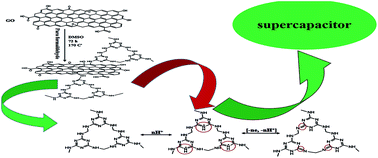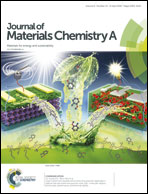Retracted Article: Thermally reduced graphene oxide/polymelamine formaldehyde nanocomposite as a high specific capacitance electrochemical supercapacitor electrode
Abstract
Supercapacitors are one of the most important methods of energy storage due to features such as high power density, fast charge–discharge rate and long cycle lifetime. In this research, a thermally reduced graphene oxide/polymelamine formaldehyde nanocomposite (TRGO/PMF) was synthesized through a polymerization method. Then, scanning electron microscopy, energy dispersive X-ray spectroscopy, X-ray diffraction and infrared spectroscopy were used to characterize the TRGO/PMF nanocomposite. Finally, the supercapacitor behavior of the synthesized TRGO/PMF nanocomposite was investigated using cyclic voltammetry, galvanostatic charge–discharge, and electrochemical impedance spectroscopy. The TRGO/PMF nanocomposite shows a 2271 F g−1 specific capacitance at a current density of 1.0 A g−1. Moreover, the stability of the electrode was studied after 5000 cycles, which revealed 91% of the initial capacitance.



 Please wait while we load your content...
Please wait while we load your content...